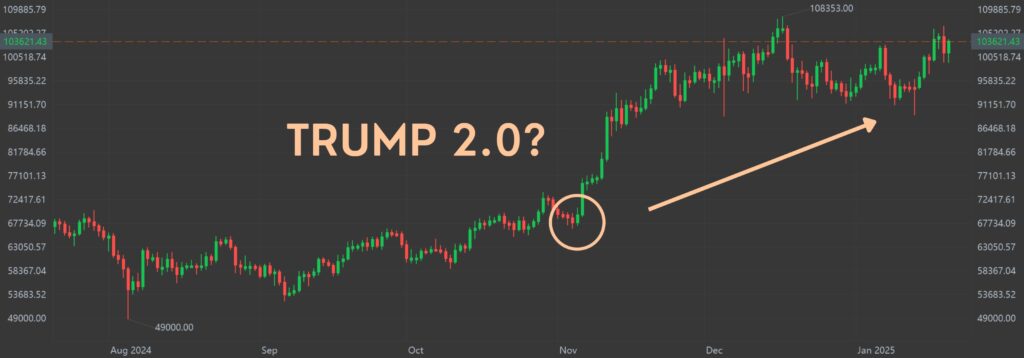Analysts suggest that Donald Trump’s return to the White House could open new possibilities for the cryptocurrency industry, including potential regulatory changes and market developments. This discussion stems from his expressed interest in cryptocurrency regulation and his vision of establishing a strategic Bitcoin reserve. Following his election win, Bitcoin reached a record high of $75,000, and this “Trump bump” saw the total value of digital currencies rise from $1.6 trillion to $3.29 trillion in 2024, with Bitcoin eventually surpassing $100,000.
Trump’s Shift Toward Pro-Crypto Policies
During his 2024 campaign, Trump’s statements highlighted cryptocurrency as part of his economic agenda. At a Bitcoin conference, he discussed making the U.S. the “crypto capital of the world” and a “Bitcoin superpower.” This contrasted with the Biden administration’s stricter regulatory approach under SEC Chair Gary Gensler, who had been known for enforcement actions against crypto companies.
Here are some possibilities regarding how Trump’s presidency might affect Bitcoin and the broader crypto industry:

Potential Benefits of a Trump Presidency for Bitcoin
Regulatory Clarity:
- The crypto industry has faced challenges due to unclear regulations. Trump indicated plans to review SEC leadership and address perceived barriers to cryptocurrency innovation.
- His administration might advance stablecoin legislation and clarify the legal status of crypto assets, potentially fostering innovation and confidence in the sector.
Strategic Bitcoin Reserve:
- Trump’s proposal to create a strategic Bitcoin reserve remains speculative but could potentially signal a shift in how governments view digital assets. While it might not involve new purchases beyond the government’s existing holdings (approximately $20 billion), this initiative could influence global perspectives on Bitcoin.
Boost to Bitcoin Mining:
- Trump has suggested that all Bitcoin mining operations could be based in the U.S., which might encourage growth in the domestic mining industry and benefit related sectors. This could also potentially address concerns about reliance on overseas mining operations.
Crypto-Friendly Appointments:
- Trump’s administration could include crypto advocates in key positions, such as the Treasury and Commerce departments. He also mentioned plans to establish a Presidential Council of Advisers for Digital Assets and appoint a dedicated crypto “czar.”
Potential Challenges and Risks
Sustainability of Promises:
- While Trump’s crypto proposals are ambitious, there is skepticism about whether they can be fully realized. His past criticism of Bitcoin as a “scam against the dollar” raises questions about the consistency of his views.
Bitcoin Stockpile Risks:
- The proposal to use taxpayer funds to increase Bitcoin reserves could be controversial. Bitcoin’s volatility and lack of intrinsic value might make it a risky choice for government reserves.
Energy and Environmental Concerns:
- Expanding Bitcoin mining in the U.S. could renew debates about its environmental impact, particularly given its high energy consumption.
Impact on the Dollar:
- Some critics argue that promoting Bitcoin might weaken the dollar’s position as the world’s primary reserve currency, potentially impacting U.S. economic influence.
What This Means for the Market
Trump’s presidency could bring changes to the regulatory environment for cryptocurrencies, presenting both opportunities and challenges for institutional adoption and innovation. However, these possibilities remain speculative. Bitcoin’s price movements are volatile, and the actual impact of Trump’s policies will depend on their execution and broader global dynamics.
Final Thoughts
Trump’s return to the presidency has sparked discussions about Bitcoin’s potential trajectory, highlighting possibilities for regulatory clarity and strategic initiatives. However, the long-term effects remain uncertain due to Bitcoin’s volatility and the challenges associated with implementing ambitious plans.
From my perspective, Bitcoin carries significant risk, and I personally view it as a speculative asset. In my own portfolio, I limit its allocation to a small portion of my overall holdings. I personally limit my exposure to Bitcoin, keeping the rest of my investments diversified across different asset classes to manage overall risk.
(This article is for informational purposes only and should not be considered financial advice. Readers should conduct their own research before making any financial decisions.)
Watch our deep dive discussion podcast now!